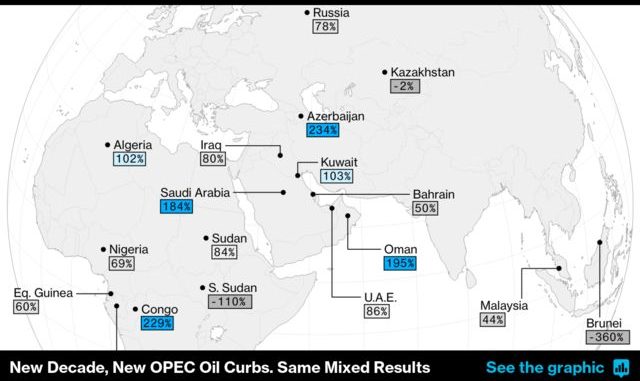
(Bloomberg) — Just days after OPEC and its allies announced their big deal to rescue the global oil industry, it’s becoming brutally clear that all they’ve done is limit the worst of the damage.
The largest coordinated production cut in history is already withering in the face of a demand collapse unlike anything the world has ever seen. After a brief rally, crude has already fallen back to an 18-year low in New York and everyone from the leaders of petro-states to the bosses of major oil companies is facing more financial pain from the coronavirus pandemic.
The dire state of the market was laid out in detail on Wednesday by the International Energy Agency. Oil demand is heading for the biggest annual collapse in history, with global consumption slashed by as much as a third this month by lockdowns aimed at containing the coronavirus.
This summer the world may still run out of space to store unwanted crude — a worst-case scenario for the oil industry that could push prices even lower.
“In a few years time, when we look back at 2020, we may well see that it was the worst year in the history of global oil markets,” said IEA Executive Director Fatih Birol.
The deal between the Organization of Petroleum Exporting Countries and its allies is helping the market, but the demand loss is so big that there is “no feasible agreement that could cut supply by enough” to offset it, the IEA said in its monthly report.
Almost a decade of oil-demand growth will be erased this year as consumption plunges by about 9 million barrels a day, the Paris-based IEA estimates. The largest hit will come this month, when fuel use will tumble by 29 million barrels a day to its lowest since 1995, the agency said.
Measures to contain the virus outbreak have effectively frozen the global economy: planes have been grounded, businesses shuttered and billions of people largely confined to their homes. The need for oil products such as gasoline and jet fuel has evaporated.
Hitting the Wall
With demand in free-fall, Saudi Arabia, Russia and others in the so-called OPEC+ alliance agreed at the weekend to slash production by almost 10 million barrels a day, or about 10% of global output.
The OPEC+ cuts, along with production losses elsewhere due to low prices and some supportive action by Group of 20 nations, will “limit the damage,” Birol said. Yet the remaining surplus is so massive the IEA warned it could overwhelm ships, pipelines and storage tanks in the coming weeks.
“Never before has the oil industry come this close” to being totally swamped, the agency said.
It’s a view shared by many in the industry, from investment bank Goldman Sachs Group Inc. to trading giant Gunvor Group Ltd., but not everyone agrees. If the OPEC+ cuts are fully implemented, energy data provider Kayrros SAS expects they will prevent the kind of industry crash that would come when storage space is exhausted.
OPEC+ will “slow down the engine enough that you’re not crashing into the storage wall,” said Antoine Halff, Kayrros’s chief analyst.
Even that would only lessen some of the suffering. This month may be one day be know as “black April,” and prices will come under further downward pressure in the coming days and weeks, said the IEA’s Birol.
*story by Bloomberg